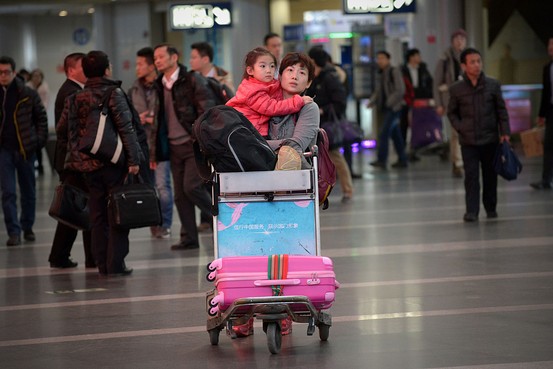Home -> News -> Media -> China Braces for Holiday Travel Crush
China Braces for Holiday Travel Crush

China is a country on the move— especially around its Lunar New Year holiday. This year, the holiday crush promises to be even heavier than before.
Government officials estimate that Chinese people will take to the air, roads and railways 3.62 billion times over a 40-day period around the nation’s most important holiday this year. The total is about 200 million more than last year—nearly three trips per person for this country of 1.3 billion—as people jostle their way home for family gatherings or to indulge their new-found passion for travel.
Officially the holiday lasts only a week, from Jan. 31 to Feb. 6, but this is often the only lengthy break for the year for much of the nation’s workforce and the mighty movement of people strains the transport system well beyond the confines of the government-set calendar.
Getting tickets to all those would-be travelers is a daunting challenge that annually tries patience as well as stamina. And it is the railway system that routinely is most unable to cope.
Trains will move some 258 million people over that period — far more than the 42 million predicted to travel by air though well short of the 3.2 billion expected to take to the nation’s roads. Railways are the transport of choice for low-cost long-distance travel, and that’s where the ticketing system routinely falls down.
Much of the criticism has focused on the railway’s online purchasing system, which has been unable to keep pace with the huge demand and also failed stop scalpers from ending up with many of the hard-to-find tickets.
While insisting that online sales were the fairest way to get tickets in the hands of travelers, rail officials told reporters at the briefing the public needs to be patient. Efforts were being made to provide online identity checks that would reduce the ticket scalping problems.
.
“There is no timetable for sorting out the problem of getting tickets,” said Hu Yadong, president of China Railway Corp, the company that has been in charge of running the nation’s railway system since it replaced the railway ministry earlier this year.
“Both the government and our company are working hard on this and I believe we can gradually alleviate the problems,” he told a news briefing.
The rail system stretches across 100,000 kilometers and its pricier high-speed service now boasts some 10,000 kilometers of track. But with high-speed tickets hard to come by, many travelers are left standing in the aisles of the slower trains.
Officials were asked whether there might be some relief for those forced to stand – maybe a discount ticketing system? “That would be technically very difficult,” said Mr. Hu.
While officials had little good news for rail passengers, they did manage to bring a few smiles to those traveling by car as the country’s notoriously expensive highway tolls will be waived for the duration of the official holiday.
But even here, expect one small catch. For those hoping to save a few yuan on the drive to that New Year’s Eve dinner – think again. New Year’s Eve isn’t officially part of the holiday, and if you want to get there on time, you’re going to have to pay.
- .U.S. Treasury looks to hold more cash to deal with future crises
- .Yum, McDonald's in Shanghai food safety investigation
- .Yellen defends loose Fed policy, says job market still too weak
- .Carl Icahn says 'time to be cautious' on U.S. stocks
- .Samsung Electronics says second quarter profit likely down 24.5 percent; worst in two years
- .U.S. jobs data seen reinforcing strong growth outlook
- .Asia stocks up on buoyant Wall Street, oil near highs

